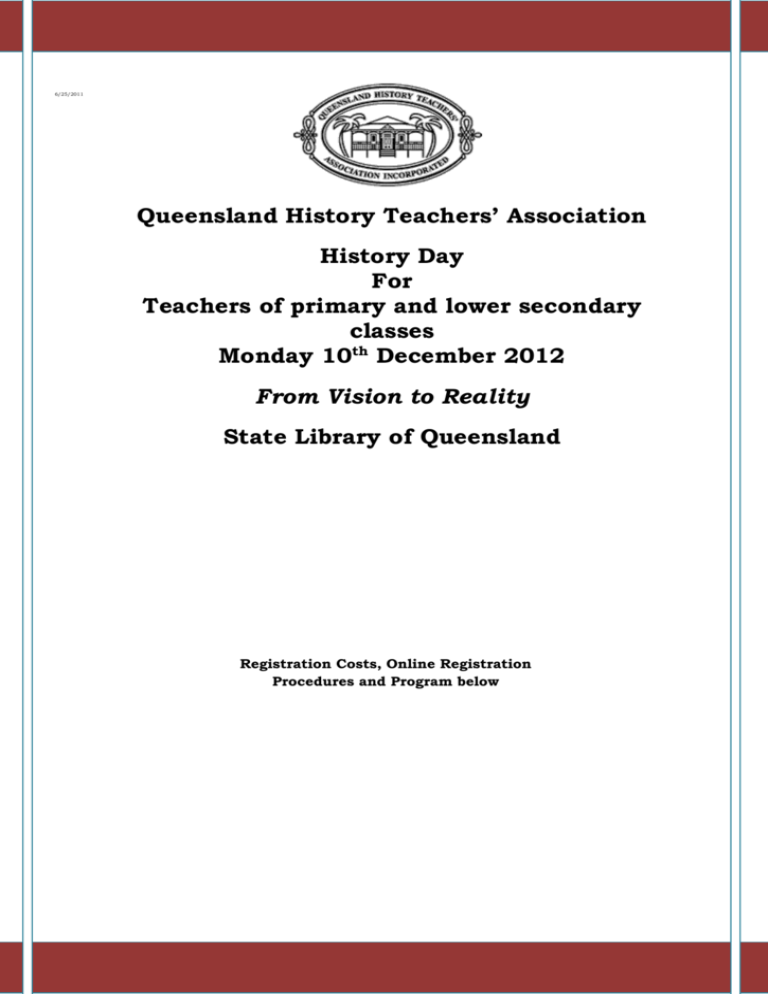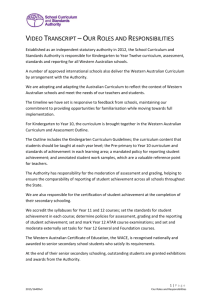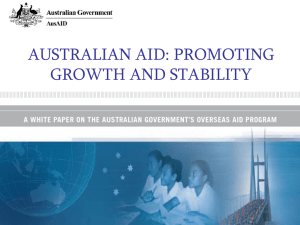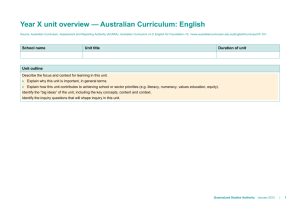Queensland History Teachers* Association State Conference
advertisement

6/25/2011 Queensland History Teachers’ Association History Day For Teachers of primary and lower secondary classes Monday 10th December 2012 From Vision to Reality State Library of Queensland Registration Costs, Online Registration Procedures and Program below Registration Costs Members Members >200k Non-members Primary Teachers Students Presenters (including GST) $132 $110 $190 $132 $44 no charge A 10% discount is available if three (3) or more teachers from the one organisation register at the same time. All registration should be completed online at www.qhta.com.au. Click on “Register”. If you need a Tax Invoice before paying make sure you choose the ‘cheque’ option and request a Tax Invoice. You are not compelled to pay by cheque but if you choose the ‘credit card’ option you will not be able to proceed without entering credit card details. Please read all instructions carefully to ensure your registration is complete. Session Presenters please register as “presenters”. If you cannot register online you may use the fax back form on the web site but note there is a charge for this option, as it requires more administrative time for processing and communicating. No refunds will be provided for cancellations after 30 November. All cancellations attract an administration charge. Certificates of Attendance will be provided at the end of the Conference. No certificates will be sent via post. For details of the workshop sessions see below. QHTA Primary and Junior Secondary History Day 2012 Coffee and Registration Welcome and General Matters Presentation to National History Challenge Winners 8:30 – 8:45 8:45 – 9:15 9:15 –10:45 10:45 – 11:15 11:15 –12:30 1A Dr Brian Hoepper Exploring ethical behaviour through the Australian Curriculum: History 1B Paul Kiem Have we lost the plot? Narrative, inquiry and learning centred teaching in history 2A Jannine McGarry Collaborating with the school library to scaffold better information literacy and library skills 2B Global Learning Centre Intercultural Understanding in the Australian History Curriculum 1C The Gap State High School Team Stirring the Sources: The Gap SHS's Journey from 'Vision to Reality', 2013 and Beyond, with the Australian Curriculum History (Years 7-10) 2C Ian Gray Making Mighty Multi-Modals What’s Hot and What’s Not 1:00-1:45 LUNCH 3A Terry Gallagher Aligning the curriculum and assessment for implementing the Australian Curriculum: History 3B Nathan Connors Exploring the Offerings of the State Library for the Australian Curriculum 3C Kay Bishop Why Bother? Twisted pathways unscrambled in the Australian Curriculum More appropriate for secondary but quite a few examples taken from year 7 3:15 (Specifically for secondary) Morning Tea 12:30 -1:00 1.45 – 3:15 1D Michelle Brown Rights and Freedoms Wine and Cheese 2D Stacey Hattenson How do we teach history in a way that is fresh, engaging and historically appropriate? 3D Gary Butner Artefacts: Real Pieces of History QHTA Junior History Day 2012 Workshop Session 1 1A Dr Brian Hoepper Exploring ethical behaviour through the Australian Curriculum: History ‘Ethical behaviour’ is one of the ‘General capabilities’ that span all subjects in the Australian Curriculum. It aims for students to ‘become citizens who behave with ethical integrity ... work for the common good and act with responsibility at local, regional and global levels ...’. This workshop explores ways in which history can play a distinctive and valuable role in this. The workshop is particularly relevant for teachers of Years 4-10. Brian taught history in secondary schools and history curriculum at university. Leaving QUT in 2002, he subsequently worked for the National Centre for History Education. More recently he has been involved in an advisory role in the development of the national history curriculum. Brian has experience as a state and national curriculum/syllabus writer, textbook author and presenter of professional development programs. 1B Paul Kiem Immediate Past President HTAA Have we lost the plot? Narrative, inquiry and learning centred teaching in history Is student centred, source based, inquiry learning all good and more traditional teacher centred pedagogy all bad? This seminar will briefly examine a false and unhelpful dichotomy that, too often, is evident in curriculum discussion. It will aim to highlight the need for a balanced approach to pedagogy if we are to engage students and successfully implement the Australian Curriculum: History. The preliminary discussion will be given a practical focus with the presentation of three Depth Studies that deal with Year 7-10 topics in the Australian Curriculum: History. Paul is immediate Past President of the History Teachers’ Association of Australia. He has taught history at the secondary and tertiary level, published a number of school history texts, been Chief Examiner of HSC Modern History in NSW and has edited the HTA NSW journal Teaching History since 1995. He has had significant involvement in the national curriculum process. Most recently, he was a Visiting Scholar at the University of British Columbia’s Centre for Historical Consciousness. 1C The Gap SHS Team Jo-Anne Cameron, Nick Howard, Barbara Nelson, Ross Murphy and Sarah Penrose Stirring the Sources: The Gap SHS's Journey from 'Vision to Reality', 2013 and Beyond, with the Australian Curriculum History (Years 7-10) In this interactive workshop, The Gap SHS's 2013 Australian History Curriculum Committee (The Gang of Four + 1) will share its preliminary planning process, equipping participants with a framework to ponder as they begin/continue their own Australian Curriculum planning in their own school contexts. The Gap SHS has opted to put the new curriculum in place across all year levels (7-10) in 2013 and to this end we have trialled elements of the Year 9 and 10 programmes during 2012. Wideranging topics for discussion will include: our design and account of a coherent 'journey' within and across the year levels; issues connected with the choice of depth studies; the value of the QSA planning documents; the role of the C2Cs; the place of textbooks; our discovery of a range of other resources we plan to use; our intentions to enhance cross-curricular opportunities (especially with English and ICTs) and other whole-school priorities; what is happening in YOUR school. 1D Michelle Brown Albany Creek State High School Rights and Freedoms This unit will focus on writing under QSA guidelines. The workshop will include material from a three day workshop on writing assessment in QSA. A Sample Multimodal, an exemplar, Teaching Guidelines and LASD will be provided and discussed. Participants will be able to discuss writing assessment for the National Curriculum. Michelle has been teaching modern history and junior history for many years and has been a regular presenter at QHTA conferences. Her sessions are always drawcards as she incorporates innovative pedagogical practices with history rigour. She has been a member of the QHTA Executive for many years and has been a strong supporter of the National History Challenge in which her students have had consistent success. She is also a rabid Dr Who fan who reads Vampire stories and is interested in the concept of Lincoln as a vampire slayer. Workshop Session 2 2A Jannine McGarry Somerville House Collaborating with the school library to scaffold better information literacy and library skills. At Somerville House, librarians and history teachers in the Middle and Senior school join forces to develop student research and referencing skills through a joint collaboration in Year 8. These skills are reviewed, added to and practised with increasing complexity throughout each progressive year level. The ultimate aim is to provide students with a thorough understanding of evaluation skills, the referencing requirements essential to avoid plagiarism and the ability to successfully access academic sources including print, databases and the deep web to give them the added confidence to orientate themselves in any new learning environment. Examples of the processes employed will be reviewed through this session. Jannine completed a Bachelor of Applied Science (Library and Information) and followed that with a Graduate Diploma in Education. She has worked with a number of inspiring librarians and teacher librarians in both public and private schools prior to joining the Somerville library team in 2005. Her passion is to help students develop instinctive information literacy skills to deal with our increasingly information rich world. 2B Karena Menzie Global Learning Centre Intercultural Understanding in the Australian History Curriculum The Australian History curriculum offers multiple opportunities, at all year levels, to explore the General Capability of Intercultural Understanding: from the investigation of their own cultural heritage in the early years; to the exploration in upper primary of the rich diversity brought through immigration; and the opportunity in lower secondary to examine the very foundations of culture. Effectively taught this enhances students' positive sense of self and the ability to be more open and accepting of the values, beliefs and customs of others, both in the present and the past. This session will explore ways in which educators can use the General Capability of Intercultural Understanding to enhance the History curriculum and use the History curriculum as a vehicle for students to reflect on their intercultural understanding. Free Global Education resources will be provided to all attendees at the session to assist them in this process. Karena, we are not having a primary stream in December. We are providing a few generic workshops which primary school teachers can attend if they want. We could not get enough rooms at the State Library to allow us an extra stream for primary school teachers. Are you able to make it relevant to lower secondary as well as primary and have some kind of generic session on the topic which could go across levels? 2C Ian Gray Somerville House Making Mighty Multi-Modals Ian will explain how Middle School students can create high quality, Historical, time-saving, multi-modal presentations that relate to the Australian Curriculum, develop digital literacy, and can be re-used as learning objects in subsequent years. Most of the examples will not require high levels of technology or technological skill. Ian is Director of eLearning at Somerville House. He regularly presents at conferences and has been a teacher for many years. He was a member of the QSA’s History Syllabus Sub-committee for many years and was one of the writers of the SOSE program. He is particularly passionate about engaging students with technology and making the most of students’ innate curiosity about technology. 2D Stacey Hattensen How do we teach history in a way that is fresh, engaging and historically appropriate? How do you teach students to think and work like historians without sacrificing engagement and most of all your sanity? Teaching history is more than just telling a story and it is more than completing the chapter in the history text book. Underpinning good teaching practice is the ability to develop through the historical context a way to build student knowledge AND skills. This workshop will unpack some of the tools and strategies explored in a new publication, Connecting with History (Curriculum Press, 2012). It will focus on the HOW, the WHY and the WHAT IF of history, using the Australian Curriculum as the organiser and student-centred inquiry learning as the catalyst. The workshop will illustrate ways to build on the best of your teaching practice and focus on familiar and practical, classroom-friendly strategies and tools that teachers can use in focused historical inquiry to builds skills and challenges thinking. Stacey is a primary educator and writer. She is a strong inquiry learning advocate who has worked on Queensland and national education projects including Discovering Democracy Civics and Citizenship Education project, the National History Project and the Values for Australian Schooling project. She has authored a number of books including: Discovering Democracy primary units and Australian Readers series, The Big Australia Day Book, Making History: Primary and most recently Connecting with History: Strategies for an inquiry classroom (Curriculum Press). Stacey is currently the Program Director, Content for Education Services Australia, responsible for procuring digital classroom resources to support the implementation of the Australian Curriculum for all Australian schools. What’s Hot and What’s Not A look at ideas that work, resources to embrace, even ones to be wary of, and an opportunity to engage in discussion with fellow professionals Workshop Session 3 3A Terry Gallagher Queensland Studies Association Aligning the curriculum and assessment for implementing the Australian Curriculum: History This session will investigate the issues related to implementing the Australian Curriculum Achievement Standards for F-10 History and discuss some possible strategies and resources for: · Planning an assessment program · Developing assessment instruments including guides to making judgement · Making on-balance judgements about student achievement across folio of work. Participants will have the opportunity to explore the Australian Curriculum, and the QSA assessment and planning resources during this session. Terry is Manager (Policy and Implementation) in the Australian Curriculum Branch at the QSA. His role involves a range of policy and resource development activities to support implementation of the Australian Curriculum. He has led and worked on many curriculum development projects, including the Year 10 Guidelines, SOSE Essential Learnings and Key Learning Area syllabus. He was recently a member of the ACARA History learning area advisory panel. 3B Nathan Connors State Library of Queensland Exploring the Offerings of the State Library for the Australian Curriculum In this practical session, explore a wealth of onsite and online resources to complement every year of the history curriculum. Tour the collections and exhibition spaces and discover how you and your students can access and use State Library’s digitised content from your classroom. We will highlight primary source material that is freely available to all learners via multiple platforms. Inform your 2013 planning with details of upcoming exhibitions, events, learning programs and professional development opportunities. Nathan is the State Library of Queensland’s Learning Project Officer. He co-ordinates onsite and online professional development opportunities for educators and delivers study skills training to students. Nathan also teaches digital skills workshops at The Edge and develops a range of learning resources to support State Library exhibitions and events. 3C Kay Bishop QHTA Why Bother? Twisted pathways unscrambled in the Australian Curriculum Kay will explore some of the 7-10 units in the Australian Curriculum to illustrate various approaches to units of work and to assessment. She will highlight some of the shortcomings of the curriculum document and suggest ways to approach these problems. She will explore the nature of transition from one Year level to another in the Assessment Standards statements, and will demonstrate some assessment examples. Kay will examine criteria and standards matrices and look at the inclusion of the key historical understandings, such as contestability, cause and effect, continuity and change and perspectives. Kay is the President of QHTA. She was Head of Faculty at John Paul College and Chair of the QSA History Syllabus SubCommittee. She was also a member of the State Panel for Ancient History since its inception until 2006, when she “retired”. Since “retirement” she has taught at Somerville House and worked as Project Officer for several educational programs for ESA and is currently working on a project with the Asia Education Foundation. 3D Gary Butner Education Consultant Artefacts: Real Pieces of History This workshop, intended for teachers of Upper Primary and Middle School History, provides a pedagogical framework for the use of artefacts in history teaching. Grounded in the Australian Curriculum: History, and alluding to various theorists, propositions concerning the use of artefacts in thinking history classrooms will be offered and discussed. A dalliance with postmodernism and museums will also be included. Participants are strongly encouraged to bring examples of how they have used artefacts in the history curriculum. Gary is an educator with wide ranging experience. He has been a classroom teacher for many years, a Director of Studies at various schools and a regular presenter at conferences. He currently offers educational consultancy services to schools, is involved in writing textbooks, and also works in tertiary institutions.







